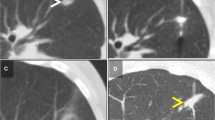Abstract
Renal cell carcinoma (RCC) local recurrence after radical nephrectomy is uncommon. When feasible, surgical removal remains the primary treatment strategy; nevertheless, local RCC relapse management is controversial, and less invasive procedures may represent an attractive option to achieve oncologic control. The aim of our study was to assess the feasibility, safety, and clinical outcomes of image-guided percutaneous microwave ablation (MWA) for RCC local recurrence in patients initially treated with nephrectomy with curative intent. 10 consecutive patients underwent CT-guided percutaneous MWA of a total of 10 retroperitoneal nodules. Inclusion criteria were: histologically verified retroperitoneal metastases, previous radical nephrectomy, lesion no larger than 3 cm, no other metastatic site elsewhere. All the procedures were performed under moderate sedation choosing the most favorable patient decubitus. If deemed necessary, pneumodissection was induced before ablation. After the antenna placement inside the target lesion, thermal ablation was achieved by maintenance of a power of 100 W for a total time between 2 and 4 min. All patients were observed overnight and discharged the following day if clinically stable. Technical success was obtained in 100% of patients. One patient was re-treated to complete oncologic response with repeat MWA. No major complications were observed. No patients demonstrated local recurrence at a mean follow-up of 26 months. MWA is a safe and effective treatment strategy for loco-regional relapse of RCC following radical nephrectomy. This technique may represent a valuable approach for patients who are not eligible for surgery.


Similar content being viewed by others
References
SEER Cancer Statistics. Kidney and Renal Pelvis Cancer - Cancer Stat Facts [Internet]. NIH. 2018 [cited 2019 Feb 18]. https://seer.cancer.gov/statfacts/html/kidrp.html
Krokidis ME, Orsi F, Katsanos K, Helmberger T, Adam A. CIRSE Guidelines on percutaneous ablation of small renal cell carcinoma. Cardiovasc Intervent Radiol. 2017;40:177–91.
Bartoletti R, Cai T, Tosoratti N, Amabile C, Crisci A, Tinacci G, et al. In vivo microwave-induced porcine kidney thermoablation: results and perspectives from a pilot study of a new probe. BJU Int. 2010;106:1817–21.
Chan P, Vélasco S, Vesselle G, Boucebci S, Herpe G, Debaene B, et al. Percutaneous microwave ablation of renal cancers under CT guidance: safety and efficacy with a 2-year follow-up. Clin Radiol Elsevier. 2017;72:786–92.
Carrafiello G, Laganà D, Mangini M, Fontana F, Dionigi G, Boni L, et al. Microwave tumors ablation: principles, clinical applications and review of preliminary experiences. Int J Surg. 2008;6:S65–S6969.
Itano NB, Blute ML, Spotts B, Zincke H. Outcome of isolated renal cell carcinoma fossa recurrence after nephrectomy. J Urol. 2000;164:322–5.
Acar Ö, Şanlı Ö. Surgical management of local recurrences of renal cell carcinoma. Surg Res Pract. 2016;2016:1–6.
Zhou W, Herwald SE, Uppot RN, Arellano RS. Image-guided thermal ablation for non-resectable recurrence of renal cell cancer following nephrectomy: clinical experience with eleven patients. Cardiovasc Intervent Radiol. 2018;41:1743–50.
Malloy PC, Grassi CJ, Kundu S, Gervais DA, Miller DL, Osnis RB, et al. Consensus guidelines for periprocedural management of coagulation status and hemostasis risk in percutaneous image-guided interventions. J Vasc Interv Radiol. 2009;20:S240–S249249.
Eisenhauer EA, Therasse P, Bogaerts J, Schwartz LH, Sargent D, Ford R, et al. New response evaluation criteria in solid tumours: Revised RECIST guideline (version 1.1). Eur J Cancer. 2009;45:228–47.
Cardella JF, Kundu S, Miller DL, Millward SF, Sacks D. Society of interventional radiology clinical practice guidelines. J Vasc Interv Radiol. 2009;20:S189–S191191.
Filippiadis DK, Binkert C, Pellerin O, Hoffmann RT, Krajina A, Pereira PL. Cirse quality assurance document and standards for classification of complications: the cirse classification system. Cardiovasc Intervent Radiol. 2017;40:1141–6.
Herout R, Graff J, Borkowetz A, Zastrow S, Leike S, Koch R, et al. Surgical resection of locally recurrent renal cell carcinoma after nephrectomy: Oncological outcome and predictors of survival. Urol Oncol Semin Orig Investig. 2018;36:11.e1–.e6.
Escudier B, Porta C, Schmidinger M, Rioux-Leclercq N, Bex A, Khoo V, et al. Renal cell carcinoma: ESMO Clinical Practice Guidelines for diagnosis, treatment and follow-up. Ann Oncol. 2019;25:49–56.
McLaughlin CA, Chen MY, Torti FM, Hall MC, Zagoria RJ. Radiofrequency ablation of isolated local recurrence of renal cell carcinoma after radical nephrectomy. Am J Roentgenol. 2003;181:93–4.
Bang HJ, Littrup PJ, Goodrich DJ, Currier BP, Aoun HD, Heilbrun LK, et al. Percutaneous cryoablation of metastatic renal cell carcinoma for local tumor control: feasibility, outcomes, and estimated cost-effectiveness for palliation. J Vasc Interv Radiol. 2012;23:770–7.
Monfardini L, Varano GM, Foà R, Della Vigna P, Bonomo G, Orsi F. Local recurrence of renal cancer after surgery: prime time for percutaneous thermal ablation? Cardiovasc Intervent Radiol. 2015;38:1542–7.
Funding
This study was not supported by any funding.
Author information
Authors and Affiliations
Corresponding author
Ethics declarations
Conflict of interest
The authors declare that they have no conflict of interest.
Ethical Approval
All procedures performed in studies involving human participants were in accordance with the ethical standards of the institutional and/or national research committee and with the 1964 Helsinki declaration and its later amendments or comparable ethical standards. This study has obtained the Institutional Review Board (IRB) approval.
Informed Consent
Informed consent was obtained from all individual participants included in the study.
Additional information
Publisher's Note
Springer Nature remains neutral with regard to jurisdictional claims in published maps and institutional affiliations.
Rights and permissions
About this article
Cite this article
Ierardi, A.M., Carnevale, A., Rossi, U.G. et al. Percutaneous microwave ablation therapy of renal cancer local relapse after radical nephrectomy: a feasibility and efficacy study. Med Oncol 37, 27 (2020). https://doi.org/10.1007/s12032-020-01354-0
Received:
Accepted:
Published:
DOI: https://doi.org/10.1007/s12032-020-01354-0




